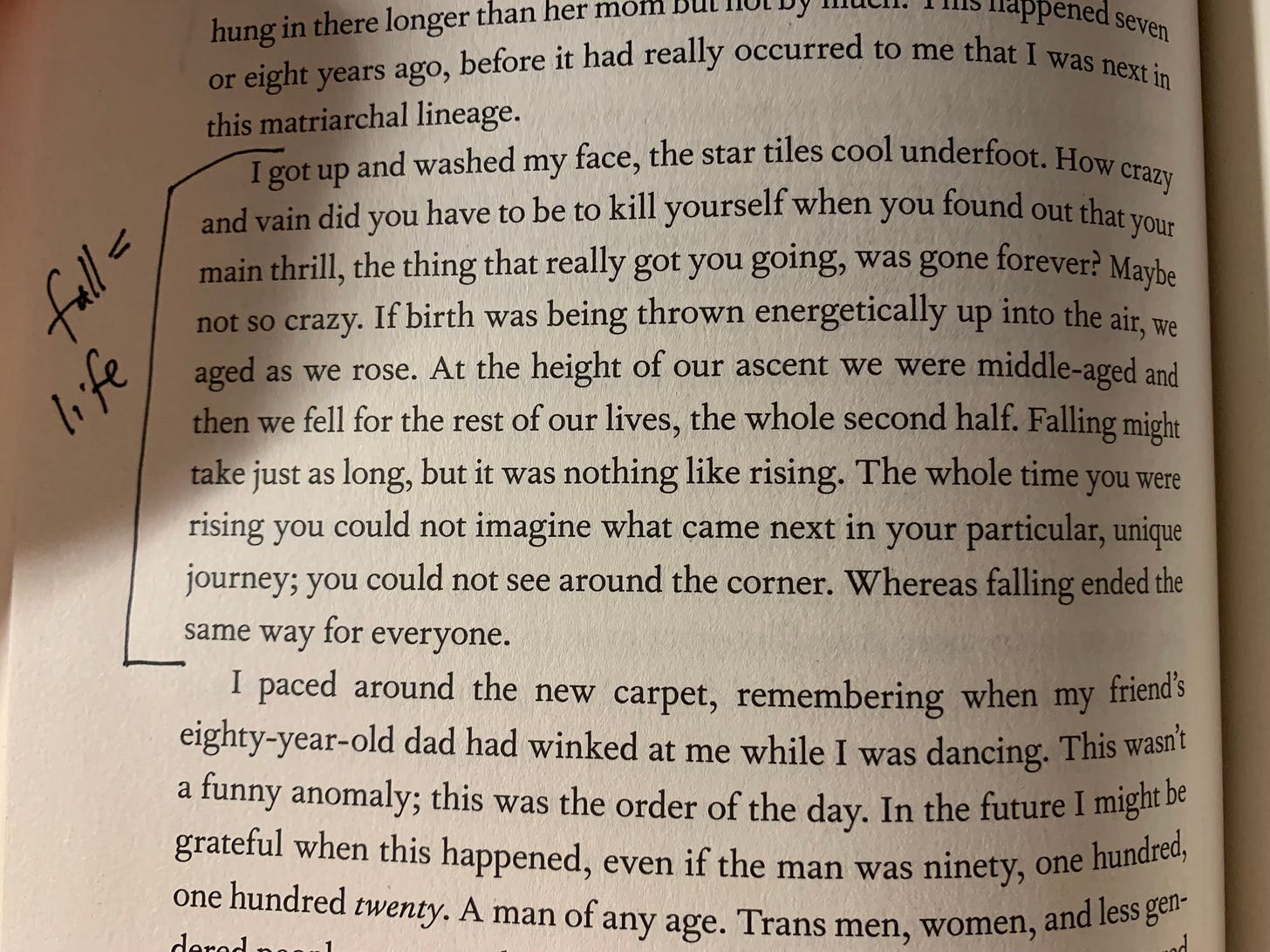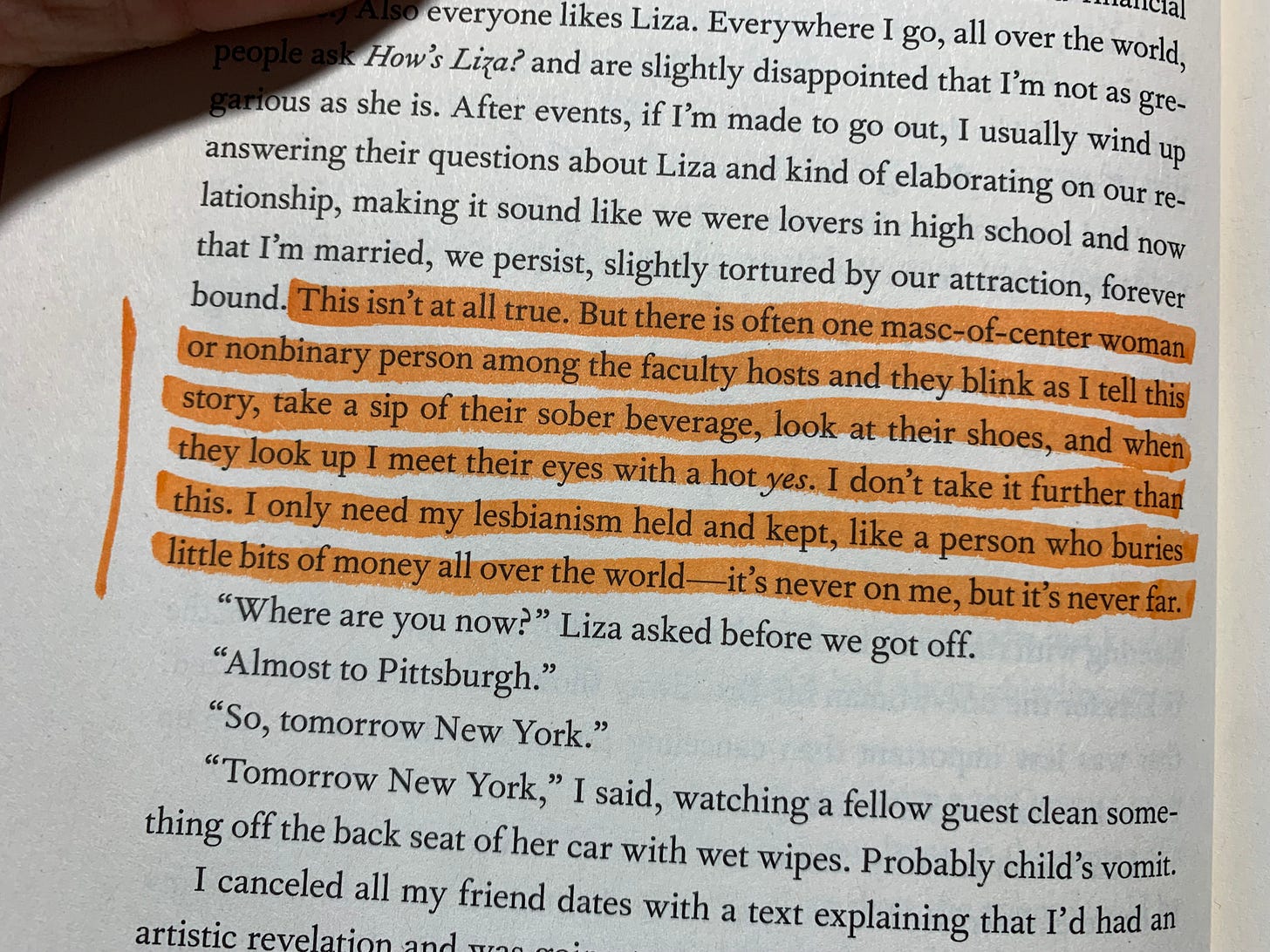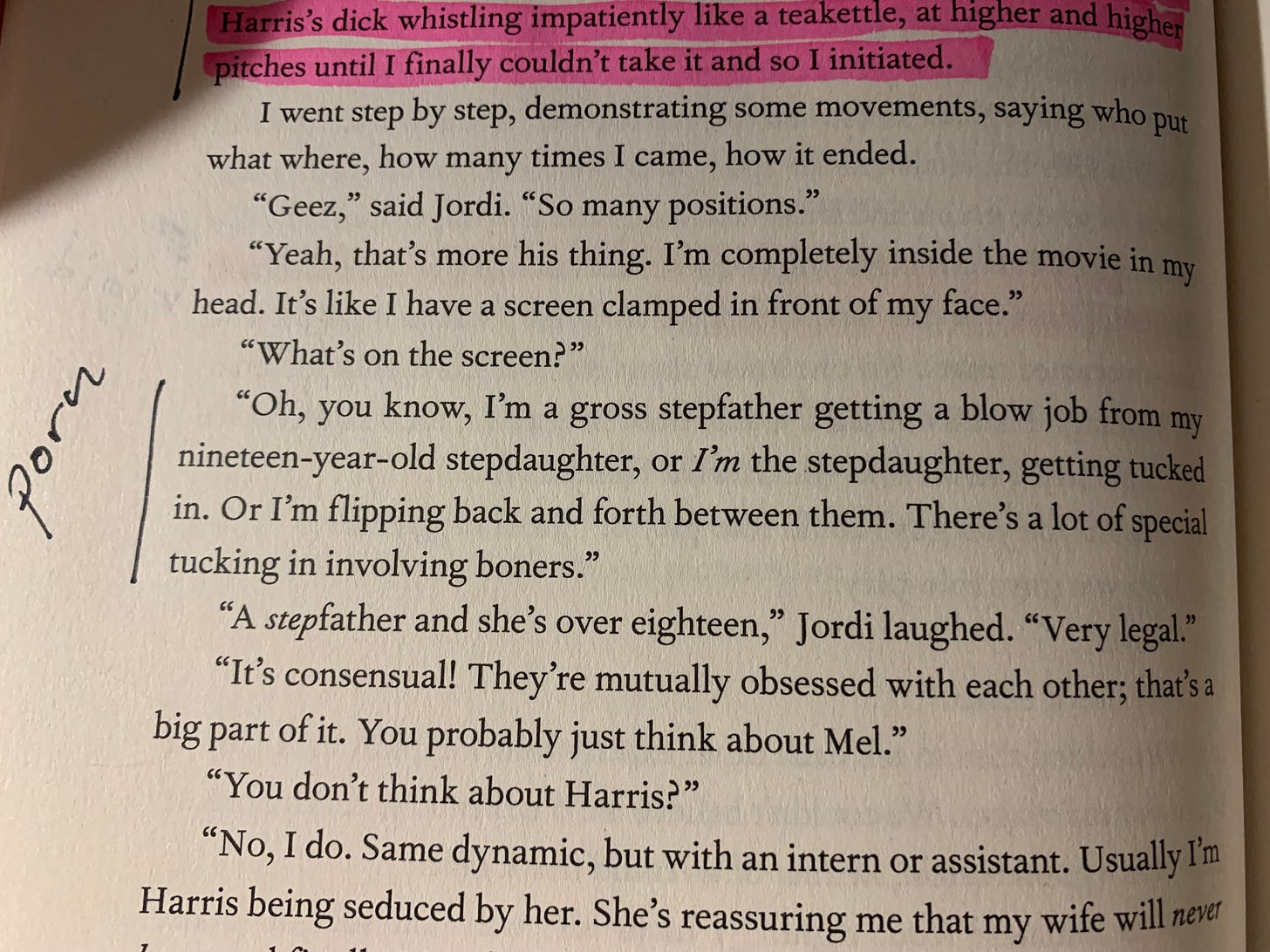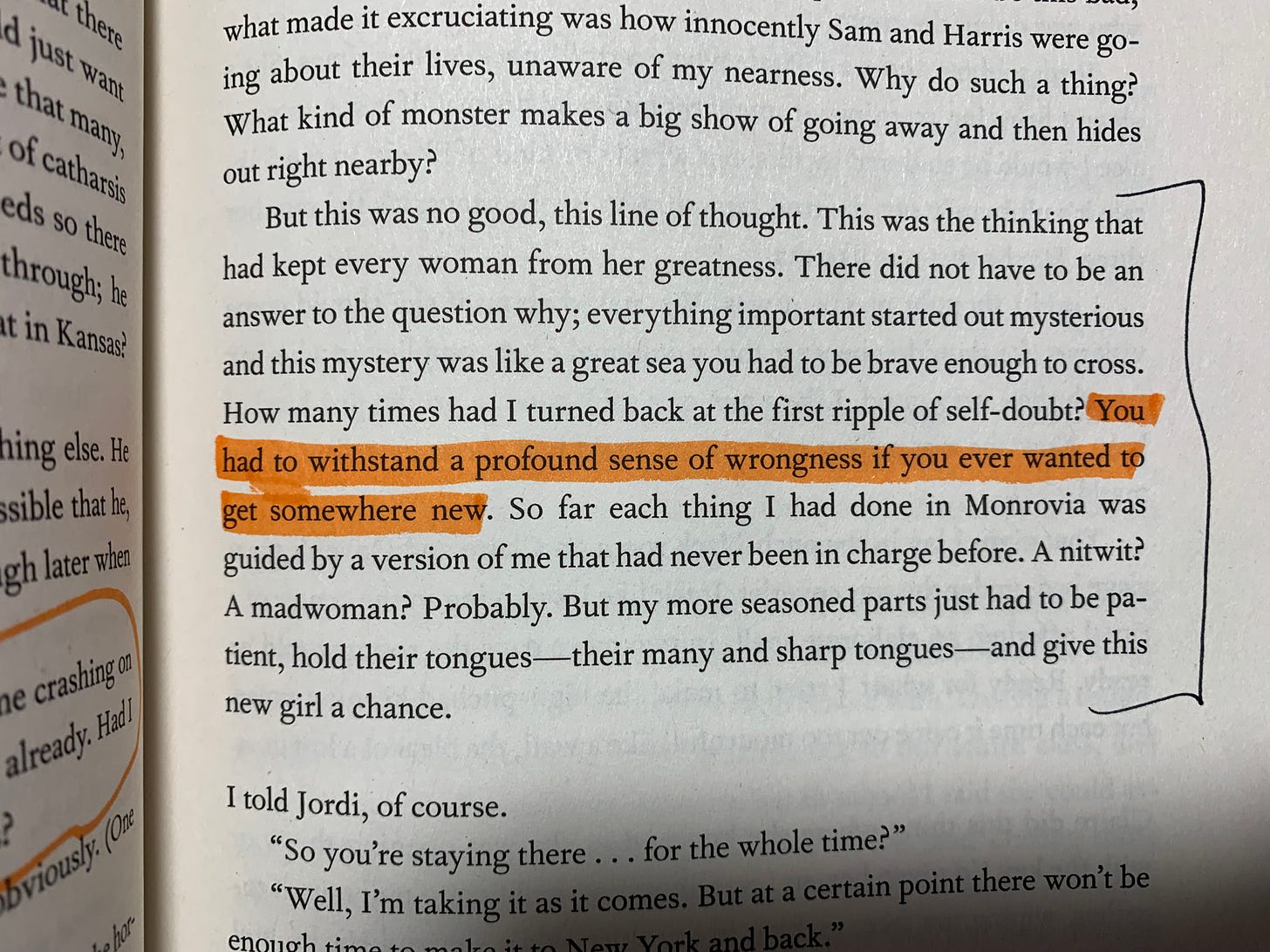Miranda July’s “ALL FOURS”
Fiction from The Top 10 Novels of 2024 by The New York Times
July even made me think of her as being a sort of 21st century female Philip Roth. Roth’s My Life as a Man specifically was the novel of his that came to mind. The sex, the manic hysteria, the lacerating wit and sexual taboos. All of it sounded familiar when I thought of Roth’s book.
I’ve mentioned this in Substack Notes quite a lot lately: I’ve decided to read some of the brand-new, New York Times Top 10 fiction books out in 2024. Why? Well, for one thing, because I almost never read contemporary novels (exceptions being books such as The Girls by Emma Cline and Lapvona by Ottessa Moshfegh, among select others). And for another thing: Because I do not read enough women writers, past or present. (Though I do read some, of course. Who doesn’t love the brilliant Joan Didion?)
But also: I wanted to know what all the popular fuss was about. Why were people talking about books like Sally Rooney’s Intermezzo or Miranda July’s All Fours? Why were these women being nominated for awards, talked about everywhere, dominating the literary discourse?
I went into this process hyper-biased. I referred to them as “hate-reads.” I had a $200 gift certificate from Christmas/my birthday so I decided to read the books as mocking polemics; I’d criticize them brutally and have some fun along the way, publishing mean but honest essays on Sincere American Writing.
But then I read Intermezzo and fell in love with it. Despite Rooney being a self-described “Marxist” and boycotting Israel—two things I hate with a passion—I loved her book and after reading up on her and listening to some recent interviews I even decided I liked her as a human being.
Next on the chopping block—I figured this one would be easier to destroy and hate—was the trendy Miranda July and her 2024 novel All Fours which was at the top of the Ten Best Novels of 2024 New York Times List and which was a finalist for the National Book Award.
I rolled my eyes while rolling up my literal and metaphorical sleeves and dug in.
And of course I fucking loved it.
~
First, some basics on July. (She legally changed her name as a teen.) *(For some bizarre reason I was conflating July with another woman author I thought had the last name of July but turned out to be the brilliant Nadine Gordimer. Maybe she had a story with July in the title? Who knows. Psychological associations are fascinating, right?)
July is 50. Born in 1974 in Vermont, raised in whacky, delicious Berkeley. (I lived in the Bay Area for a decade, from 2008 to 2019.) Parents were both writers and professors who taught at Goddard College and founded a publisher which focused on spiritual and alternative health titles. She was (and it sounds like she still is) into punk rock, DIY, her own odd, angular path. (Me, too.) She did performances at Berkeley’s famous 924 Gilman Street, where bands like Green Day and AFI and many other early 1990s punk bands got started, the famous Bay Area punk incubation station.
July went on to go to film school at U.C. Santa Cruz but didn’t last long. She ended up in Portland, where I currently live as well. She’s directed films, made short films, written novels and story collections, has done various forms of art. She’s friends with many of the bigwigs of the punk/art-house 1990s rock scene in the Pacific Northwest. If she were a band she’d probably be Sonic Youth circa 1985. She currently lives in Los Angeles. (Hopefully safe from fires.)
Anyway. Her book. All Fours.
~
The novel is a very “easy” read in terms of diction, tone, style, syntax. Basic words, simple language, understandable. First-person, past-tense, which I prefer much more than Sally Rooney’s millennial/Gen Z style of first- or third-person present-tense active voice (“John goes; John yells”). Difference, I suppose, between a 33-year-old writer and a 50-year-old (Gen X) writer.
The plot, too, is very simple: 45-year-old premenopausal narrator—a semi-famous visual artist—in a traditional, conventional marriage with a kid (a nonbinary “they” as it were, which I admit was a little challenging for me to read grammatically) says she needs a break from life, decides to go on a trip across country from LA to NYC solo, starts the trip and then secretly ends up staying in Monrovia, only half an hour away from her home. Here she meets a very attractive, much younger man, who is married, and they fall in love over the course of two-and-a-half weeks. The whole time they never actually have penetrative sex, but they do many other sexual things. And she lies to her family the whole time as well, stringing them along, making them think she’s plowing through Utah, Indiana, Pennsylvania, and then in Manhattan with friends.
Reading the plot on the dust jacket before I started I thought, This sounds patently boring and navel-gazing. Nothing happens. How could it?
But oh, how wrong I was.
It’s a beautiful story, it really is. Nothing really major happens externally. She lies about the trip. She stays in a motel 17 days. She messes around with a younger man. She returns to her life and sees it differently. End of story.
But it’s so, so much more than that.
Really the novel is about the protagonist’s search for inner truth, depth, beauty and meaning. She loves her husband, Harris, but feels bored and trapped. All that truly bonds them is their deep platonic friendship and their nonbinary kid, Sam. Sex, for the narrator, has become predictable and required only for sustainability. The joy has all gone out of it. She’s an unconventional woman trying to fit herself into a pat, boring, conventional life.
So she needs an escape, a fresh taste of freedom. Over the course of the novel she thinks a lot about her past, about the sordid reality of ageing and eventual death, about time and about the bipolar, manic ins and outs, ups and downs of life. She’s searching for something but she doesn’t exactly know what.
Davey, the young hot man she falls for in Monrovia (“New York” to her child and husband) won’t have literal, full sex with her but they do just about everything else, including Davey pulling out her old bloodied tampon and then inserting a new one as a sort of kink-positive, vulnerable, semi-shocking sex-but-not-sex maneuver. The sexual tension is palpable. Davey loves her but he’s married and he loves his wife, too, and they want to have a baby and they envision a future. Davey mentions that if they (he and his wife) had $20,000 they could change their lives for the better.
Having just acquired that precise amount from a whiskey company using a sentence she’d written, she decides to stay in Monrovia and hire Davey’s wife (who she discovers is an interior decorator) to decorate her motel room. Elaborately. Elegantly. For twenty-thousand dollars. And then this room is used as a place to surreptitiously meet with Davey, where they semi-fondle, dance and talk but never actually fuck. (Much of the novel shimmers with the slight heat of unbelievability; there’s a consistent whiff of unreality and illusion. One must read the novel with poetic license in mind. Some of what occurs doesn’t feel super realistic. But it’s right on the edge. It could happen.)
The voice of the narrator is one of the strongest, most powerful voices I think I’ve ever read. I thought the voice of Intermezzo was strong—and it was—but this is a whole new dimension. There is of course a plot for the novel, but it’s not about the plot; that’s just to keep you entertained externally: The real journey of the book is the narrator’s inner odyssey moving from trapped, typical midlife woman to wild free agent of her own life, warrior-existentialist who does things her way on her own terms. A powerful change occurs internally, which then manifests externally as well.
The complexity of the emotions of this narrator cannot be overstated. She feels everything you imagine feeling and then some. The violent, brash ups and downs of her emotions are strikingly real and true-to-life. You know how we all think something superlative, something extreme, one moment and then, discovering we were making assumptions and were dead wrong, we suddenly change and become totally, erratically upbeat? (Maybe well-adjusted people aren’t like this, but July isn’t well-adjusted, and neither am I; we’re artists.)
July keeps us turning the pages due to the simmering sexual tension; the profound and pumping voice; the deep connection to this very authentic and relatable narrator; and the inner journey we’re embarking on, slowly peeling away the complicated, nuanced layers of the onion piece by shimmering shallow piece until all that’s left is the pulsing red orb of human experience.
There is a LOT of sex in this book. Much more than I’ve ever read on the page before in any book, Henry Miller included. Nabokov included. The novel is drenched in sex; it drips sex off the page every second. Sex between the narrator and other women. (She swings both ways.) Sex in her head, fantasizing while masturbating alone. Masturbating with another woman. Fucking Davey in her mind. Talking about sex. Texting about sex. Obsessing about sex. Lots of talk about vaginas, asses, “pussy.” July doesn’t hold back when it comes to sex, sexual language, or sexual taboos. (One of those radical feminists who want to own the language of women and sex.)
She writes about the narrator fantasizing about sex with her parents. Kids and sex is even mention off-handedly, but not in a way where it’s deemed ok. But still. Even sex with a dog at one point is passingly pointed to. Anal sex. You name it. “Big dick” this and “big dick” that. July—an avowed DIY punk-feminist—is not shy about sexual explorations.
I’m sure her view would be/is, given her strong feminist background: Men write about sex all the time; why can’t women? And yes, I agree: Why not? There’s no hard and fast rule. Might as well. Nothing wrong with female sexuality. It’s just the same as male sexuality, except different in its nuances and biology, of course.
There is the child (about eight or nine, I think, in the novel) being a “they,” and the fact that his is never explained. Sam almost died stillborn but miraculously lived; this is a repeating trauma for the narrator. The child being nonbinary is, unless I somehow missed it, never explored or explained. I found this odd. But maybe feminists would say that’s my “male privilege,” expecting some kind of “explanation” at all. Why should the narrator have to explain? And yet for me this was odd and it tugged at my sleeve throughout the book. Why nonbinary? At one point the narrator gets angry at another character and says, in her own mind, Don’t gender my child. Later the narrator says, Since science got her gender wrong…
But science has nothing to say on gender. Gender is a social construct. What’s real is biological sex. You’re either a boy or a girl; you either have X chromosomes or Y chromosomes; you either have a vagina or a penis: That’s reality; that’s science; that’s nature. You can’t gaslight reality/nature/biology. (Though the Left, God bless em, have tried their best the past decade!)
There are some ill-begotten feminist and social-political messages in the novel which jarred me and pulled me out of the narrative. Contemporary writers seem unable to avoid this. Same thing happened in Intermezzo. They just can’t help preaching to the converted choir. I don’t like this. It takes me instantly out of the narrative. And yet, 85% of what the narrator says, thinks and feels, around power dynamics, men and women, love and sex, I generally understand and more or less agree with.
When the narrator returns from her “New York trip,” she is changed internally but pretends that all is fine. (This felt unrealistic to me, honestly; her child and husband asked almost nothing about the trip, didn’t want to see pictures, anything. This seemed to serve the plot but not real life.) Until she and Harris get into a raging fight and she tells him not the truth of the trip but the fact that she feels angry, bitter and trapped, and that she wants out. (And that she had actual sex with not Davey but a woman…which is also true.)
This changes everything.
Harris walks off. They become separate, symbolically and literally and psychologically. But eventually they come back together; they merge again but not like before. Now they begin a non-monogamous marriage. She admits she had sex with someone, but only tells him about the older woman she has sex with (long story), not Davey. Harris and her decide they will no longer fuck each other and that they’ll be allowed to see other people on the side.
She feels free doing this…until she doesn’t. She falls for a sexy younger woman who after a few months discharges the narrator like a badly used tampon, hurling her into the metaphorical wastebasket. Davey has moved on, taking the money they made and leaving Monrovia for Sacramento and chasing his dancing dreams. (He wants to be a famous dancer.)
The narrator finds herself once again alone and on her own. She speaks with many women friends, researches things online, and decides she’s premenopausal. She’s 45, after all. She begins to learn acceptance; she begins to understand that we lose everything in the end, even our own lives. Everything is ephemeral, fleeting, temporary; nothing and everything matter all at once. She is reborn.
This novel was the most “contemporary” book I’ve ever read. Progressive white women love it, I’m sure. It was interesting to read so much about women, their inner lives and loves and desires and journeys and emotions and physical bodies and marriages and psychological drives, fears, worries. Funny: Both Intermezzo and All Fours explore Age Gaps, deep sexual urges and taboos, and the search for women of deep spiritual satisfaction. Clearly, July’s narrator—like July herself—is avantgarde, as Gen X called it in their era (the 80s and 90s). My sister is Gen X, 13 years older than me; 55 to my 42.
After reading both these books I feel exhausted, by the contemporariness of them, by the emojis and iPhones and hyper-meta-modernity of it all. The sarcasm and bleak irony and self-mocking navel-gazing hubris. (And yet brilliance.) July’s novel, I should add, is fucking hilarious. It’s a very funny, satirical novel in the vein of, say, Kurt Vonnegut or even Mark Twain. The writing feels very polished, but not MFA-y, not “program fiction.” A perfect blend of precision and simplicity. A real novelist, like Zadie Smith, say.
I don’t agree with all of July’s thoughts and ideas, as expressed in her real life or in her fiction. But a lot of stuff I do. And the novel is simply a joy to read. I can understand why the book was a finalist for the National Book Award. Comparing these contemporary books to 20th century authors such as Philip Roth, Bukowski, Bellow, Cheever, etc, is like comparing apples to oranges, or even more, maybe walls to roofs: They’re just of a completely different nature. One isn’t necessarily “better” than the other, they’re just existing in different spaces, realities, times, dimensions. (Though if pressed I’d go with the 20th century authors.)
July even made me think of her as being a sort of 21st century female Philip Roth. Roth’s My Life as a Man specifically was the novel of his that came to mind. The sex, the manic hysteria, the lacerating wit and sexual taboos. All of it sounded familiar when I thought of Roth’s book.
And the themes are universal. Who hasn’t at some time or another wanted to flee their boring, stale life, run away, chase the gods, break stuff, feel free and independent even if just for a brief moment? The daily bullshit of taking out the trash and recycling, sharing a home with someone, having kids, going to work, just the daily struggle of surviving and being alive in 2024 or any time. Of course we’ve all felt this. And it’s not a place we can stay: Escaping those grim limitations. But we can, I think, experiment with those fantasies, search them out, hunt for them, capture them and drag them back into our real lives.
And maybe, just maybe, when and if we successfully do this, we can even change our real worlds. This is what July’s narrator does: She shifts from fantasy to real life and, merging the two together, experiences genuine change.
Change, of course, is the one true reality of all human experience. Good or bad, right or wrong, easy or hard: Life is and always will be enveloped by change.










I loved July's book too. Whether or not she went out of her way to write so "comtemporarily" doesn't matter to me, because she succeeded so spectacularly as part of capturing a moment in cultural time. What a story! And it does have a whiff of magical realism.